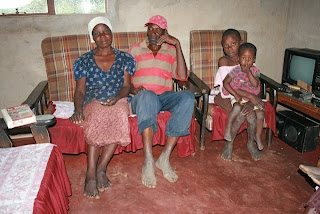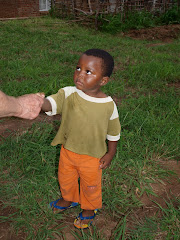Thursday, January 15th
The trip out into the Mt Darwin district the following day was a particularly poignant one for me, as I had lived in the region for a special part of my childhood, then lived and worked there as a married man with a young wife and two small children.
Even before we had found opportunity to sit and speak with the people in their villages, we noticed profound evidence of decay. The extremes we had observed the day before in the Urungwe tribal area were equally apparent as we traveled into Chief Chiweshe’s realm. Nation-wide scarcity of something as basic as bicycle inner tubes and patches and compound glue was evident by the conspicuous absence of bicycles, perennially abundant modes of haulage and transportation that had been such a common fixture in previous years.
-81.jpg)
In spite of abundant rains, the crops were very poor if evident at all. Previously available small subsidized packets of registered and treated maize seed had been absent for some time, as was the case with Compound ‘D’ fertilizer, traditionally applied at planting and, later, the fondly referred to “A.N.” (ammonium nitrate) widely used as a top dressing for the established plants.
Once plentiful chickens, goats and cattle were very few and far between. Domesticated guinea fowl had become a common addition to the few scrawny chickens that still scratched around the villages. At one point, we encountered a pair of forlorn looking muscovy ducks wandering aimlessly along the dirt road.
On the way to Karanda Hospital, we called in at what had been Chironga mission station. The now government-controlled school classrooms that the missionaries had built still stood there, as did the structure that had once housed the teacher training school. Many of the missionary houses remained, lived in by government teachers and their families.
The burial site of a missionary couple’s infant boy, and another’s grown son, was still there where I remembered it to be; wrapped in the verdant embrace of the rainy season, tucked in behind the protective bulk of a granite outcrop.
After having reached our destination, we established our temporary residence at Karanda Hospital’s lovely guesthouse. Personal nostalgia continued for me as I made my way toward the house where my family and I had lived when we first arrived there as missionaries twenty eight years previously.
I further celebrated my return just before dark, as I made my way to the village of the aged Baba Josiah. He had once been the tractor driver at the hospital station, and kind friend of our small children. I had met his son, Solomon one afternoon as I hunted for guinea fowl along the Ruya river. That was the beginning of a friendship that had stood the test of time and shifting circumstances.
-64.jpg)
I’ll take the liberty of digressing here, to tell you the story.
I first saw Solomon sitting in a dry sandy portion of the riverbed that afternoon. He was sitting on a large granite boulder worn smooth by the unrelenting flow of water in that cycle in the life of the river each year when the river ran full and strong. Customary greetings were exchanged, and I sat with Solomon on that rock as we heard of one another’s families, exchanged thoughts on local issues and began to gain a measure each of the other.
As the afternoon turned to evening, we negotiated our way out of the river bed through the wafted aroma of wild herbs that grew on the bank of the river, and up in the direction of his village. At one point, once we were in the vicinity of the community fields of maize stubble, we stepped off the path to make our way through the dry golden left-overs of the year’s crop to where we found a ripe watermelon on the vine. Making ourselves comfortable in the dry maize litter, we shared that watermelon and began to find out more about one another. It was there, and in the ensuing days that Solomon’s personal story emerged.
At the age of twelve, he had left home early one morning as he had done every other morning of the school year. Bare foot and dressed in khaki shirt and shorts he joined his friends to walk, rulers and pencils in hand, to the school he attended. That day, the whole school was visited by guerilla combatants, every child abducted and taken on a force march that lasted many days. The column made their way north toward the Zambezi Valley and the river that gave it its name. In the course of the journey, a number of children died of thirst and exposure. On one occasion, some were killed in the cross fire of a running skirmish between the guerillas and Rhodesian government security forces. Solomon told me of being so thirsty as he came across some stagnant mud in the bottom of a stream bed, that he scooped the mud into his hands to suck the moisture out of it.
Eventually he and the others who had survived made their way across the Zambezi with the aid of wooden dug-out canoes. He ended up in Tanzania, where he was indoctrinated and trained as a medic combatant.
Just before being sent into the combat war theatre, he narrowly missed being numbered among the hundreds of dead combatants killed in the famous cross-border raid by Rhodesian security forces on Chimoio Camp, in Mozambique. Eventually, after having infiltrated with a small group of fighters into the country still known then as Rhodesia, he was wounded and left for dead by Rhodesian soldiers.
After hiding out in an ant bear hole, he made his way under the cover of darkness into a nearby village where he recovered and masqueraded as a son of the family living there. Eventually, after the war ended, he made his way back to his traditional home area only to find his family’s village razed to the ground. Sitting forlornly next to the path that led past his former village, he was greeted by a person passing by. When that person heard who Solomon was, and saw the devastation evident in his sad discovery, the passer by told Solomon that his family had moved. He then told Solomon where to find the village, which he did late that evening when he was reunited, now a young adult, with his parents and siblings.
Solomon and I met a couple of years after this, by which time he had a wife and small child. I met them, as well as the rest of his family that evening as we made our way in the light of the moon from the maize field toward his village. We ended that day, gathered around a fire, where we roasted peanuts and shared them as accompaniment to stories told by firelight in the natural bonding process that took place.
That evening was repeated many times, as were hunting excursion along the river, and walks back up to the village. As our conversations continued too, they began to take on deeper meaning as Solomon discovered the dawning realization that he had been spared for a purpose. Gradually, he began to form a natural connection between his experiences of deliverance and what we spoke of in terms of a God who knows and loves each individual, with an eternal purpose in mind for mankind. The time came eventually, when he invited me into his hut and there, seated together with his young wife and infant son, he prayed for the first time to that God in the name of His Son, not through an ancestral spirit medium, and discovered the dynamic of eternal life and entrance into the abundant life that Jesus gives.
In the ensuing years, the rest of the extended family followed suit, as did the children who were added to the clan. Solomon’s younger brother, Edison, had been a school boy when we lived and worked in the area. Every weekend, he helped me with yard work and the caring of our children’s guinea pigs and rabbits and the flock of chickens that kept us well supplied with eggs. My family formed a bond with Edison too, that had remained.
Now, decades after having last seen the family, I was returning, not knowing what I would find.
-62.jpg)
I saw Baba Josiah from a distance as I disembarked from the vehicle and made my way toward the cluster of huts that represented the family home. He had lost an eye and was almost completely blind in the other. Emaciated by hunger and the ravages of age, he peered at me, approaching him in the late afternoon light. My greeting, which went along the lines of, “A! A! Muchiriupenyu sekuru?!” … “You’re still alive, Uncle?!” was greeting with silence as he tried to make out who it was who had approached him. Then, with dawning realization brightening up his face, he asked, “Ndimi vaJekisoni?!” … “Are you Jackson?!”.
In the ensuing conversation, I learned that his wife had passed away some years previous. He took me a few steps from his hut to stand next to her grave site situated in his filed of struggling maize. He explained that her wish had been that she be buried close to the village so as to be “near her children.”
Later, I walked with Baba Josiah across a small valley to Solomon’s cluster of huts. There, Baba Josiah summoned a young boy to run to the field where Solomon and his wife were working, with the word that a visitor had arrived.
A few minutes later, Solomon walked into the village, followed by his wife. She was carrying some wild vines which she had planned to prepare for the family’s evening meal. Solomon recognized me immediately and there followed a wonderful reunion. In the course of the conversation that followed, I heard that there was very little growing in the fields that year. Even the previously ever present tomato and onion plants were non-existent. The family’s flock of chickens had all succumbed to a disease that had swept through the area. Only one cow remained in the cattle kraal. The family had no food.
In the gathering gloom, we made our way back to the vehicle, collecting other members of his family along the way. I gave each family a food pack containing some mealie meal, a bottle of cooking oil, dried fish, salt and sugar.
Later, after having returned to his village I sat and visited with Solomon and heard his wife breaking into the food pack in preparation for the first real meal they had had for some time. Then I was invited and humbled to share in the relative feast that followed. Some things never die, like true friendship, genuine camaraderie, and the fundamental generosity of the Shona people. Solomon’s little girl, the youngest of five, ate with relish. She sucked the juice of the fish dish off each finger, crawled onto the chair next to her father and promptly fell asleep.
-65.jpg)
-66.jpg)






No comments:
Post a Comment